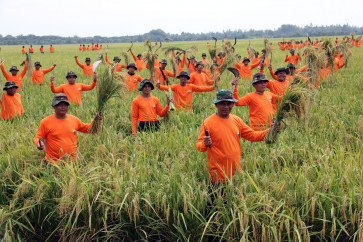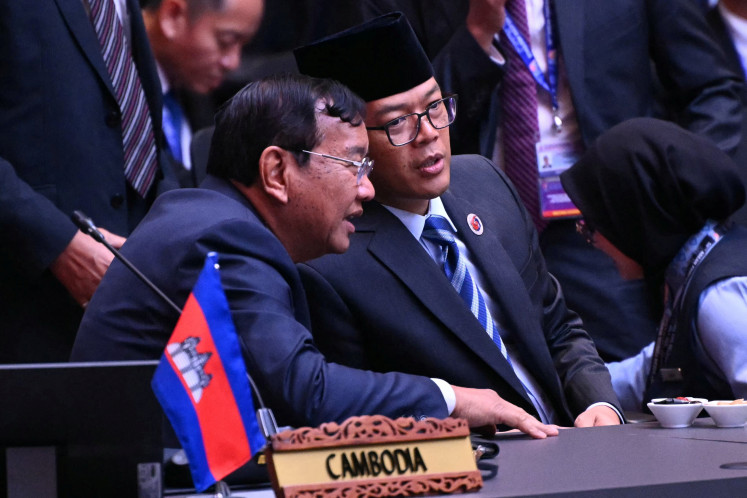Popular Reads
Top Results
Can't find what you're looking for?
View all search resultsPopular Reads
Top Results
Can't find what you're looking for?
View all search results'It is trusted, it is credible'
Jakob Oetama, Chairman, Kompas Gramedia GroupâThereâs a need for a newspaper in English, especially since it has been trusted as independent and has been proven through its contentâJakob Oetama was one of the founders of The Jakarta Post, along with Jusuf Wanandi, Muhammad Chudori, Eric Samola, Fikri Jufri, Goenawan Mohamad, H
Change text size
Gift Premium Articles
to Anyone
J
span class="caption" style="width: 148px;">Jakob Oetama, Chairman, Kompas Gramedia Group'There's a need for a newspaper in English, especially since it has been trusted as independent and has been proven through its content'
Jakob Oetama was one of the founders of
The Jakarta Post, along with Jusuf Wanandi, Muhammad Chudori, Eric
Samola, Fikri Jufri, Goenawan Mohamad, H. G. Rorimpandey and Harmoko.
On
the occasion of the newspaper's 30th anniversary, Jakob spoke about the
origins of the Post, his initial limited expectations for the paper and
about journalism in general.
Question: What were your first impressions when you were asked to help establish an English-language newspaper in Indonesia?
Answer:
I felt that it was a necessity to have a newspaper in English. In a
globalized world, our young people must not only read, but also write
[in English]. Its establishment involved several individuals, including
then information minister Ali Moertopo, Jusuf Wanandi and the chairman
of the Indonesian Journalists Association (PWI), Harmoko.
Didn't Pak Harmoko type up a letter of recommendation on behalf of the PWI to establish the Post?
Yes, he did.
Did you imagine that what was initially a small newspaper would survive and expand over the long run?
No, because it was the first [attempt]. That it has lasted for this long is quite an achievement.
What role did Kompas play in the Post's early days?
Our role from the start was in its printing. We also managed circulation. We didn't have a hand in the editorial content.
Competing publishers such as Tempo, Sinar Harapan and Kompas, came together to establish The Jakarta Post. Was this unique for Indonesia or for other countries?
Yes, of course. What came out of that competition was an English-language newspaper. I figured, why don't we synergize?
The Post was not the only newspaper published in English at that time. There were also the Indonesian Times and the Indonesian Observer. Why do you think The Jakarta Post has excelled while its competitors have since folded?
The
Post was more professional. It provided information and views that '
even though they had some subjective elements ' never let political
views defeat the truth. That was the foundation. As a consequence, it is
trusted, it is credible. The news is necessary ' even opinions are
necessary ' but credibility is very influential for the very existence
and the development of the relationship between a medium and its
readers.
What's the job of an English-language newspaper in
Indonesia, beyond serving foreign readers and offering a window to the
nation for readers overseas?
[The number of] Indonesian
intellectuals has grown. There's a need for a newspaper in English,
especially since it has been trusted as independent and has been proven
through its content.
You've used the words credibility and
independence, which are key words in the media industry. How independent
and credible is journalism in Indonesia today?
There are
many newspapers now. Many people rely on them for a living. We have to
be honest and consider the economic dimension. [Our independence] has
been affected by our own subjectivity. It is unavoidable. Some people
express their opinions coarsely and abruptly and others in a smart and
subtle way.
What is the future of English-language media in Indonesia?
I
think they will exist and even grow. The world is more interconnected
and one of its most effective tools is the media. To understand each
other, we need a bridge - and that is through English. Plus, reading
English newspapers produces a feeling of esteem.
It's
intellectually [challenging] for an educated, future-oriented and
globalized people. So far English has been a measure of intellect and
progress.










